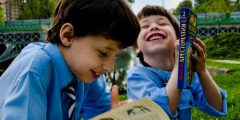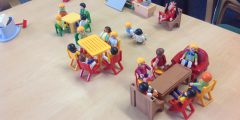Three domains of literacy
April 22, 2020
Raising reading and literacy attainment is something that is always at the forefront of educators’ minds. With a myriad of interventions and strategies out there, what is important for raising attainment in these areas? A group of school leaders and academics came together recently at the University of Nottingham’s School of Education to listen to …
From caveman to concepts: Making history count in the primary classroom
March 17, 2020
In this blog, Victoria Crooks considers six ideas for developing primary history, along with some practical strategies. “Mum you’ll never guess what happened today!” These words we’re delivered by my 7-year-old with a frisson of excitement. That morning he had arrived at school to find his classroom in near darkness. The walls and windows had …
The Rights of the Mathematician
February 14, 2020
In this post Catherine Gripton considers what children should expect of mathematics in school and the implications for how we approach the teaching of mathematics in a way that respects the child as a an autonomous learner. Our relationship with mathematics On the 24th October 2019, the UK government launched a consultation on proposed early …
Making a play for drama in the primary classroom
January 17, 2020
In this blog, Colin Morley looks at current ITE perceptions of the arts are, before looking at what the actuality of the arts offers within schools. He considers what the barriers are to their possible use and how drama might be used as a process tool within Primary teaching. How are the arts perceived? In …
Building confidence in using music in primary schools
December 16, 2019
Music both calms and invigorates the primary classroom. It adds order, injects a sense of freedom from the rest of the curriculum and stimulates the child’s creativity. In this blog, Liam Maloy from the Department of Culture, Media and Visual Studies at the University of Nottingham, reflects on his experiences of music and primary education. …
Tuning in to expert teachers: seeing beneath the surface of classroom practice
November 13, 2019
In this post, Rupert Knight considers what we mean by teacher expertise and how we might get better at looking for this in action. Speaking in an October 2019 article in the TES about the current upsurge of interest in evidence-informed practice, Mel Ainscow advised caution in the use of evidence by teachers, arguing that: …
Remember remember …
October 15, 2019
Memory is important in learning so that learning is not lost and this has been the subject of a previous blog in this series. The new Ofsted Education inspection framework is informed by a range of research evidence including on memory and learning (pages 15-17). This evidence includes many new terms from learning sciences that …
Building communities of engaged readers: an exciting opportunity for local primary teachers
September 9, 2019
In this post Helen Victoria Smith explores the idea of ‘reading for pleasure’ and how research-informed practice can build communities of engaged readers. She draws on research carried out by the Open University (OU) and United Kingdom Literacy Association (UKLA) to discuss the importance of developing ‘Reading Teachers’, and offers the opportunity for local primary …
A dog’s life?
July 19, 2019
Children today are more immersed in virtual worlds and often lack the opportunity to interact with people, animals and nature during their formative years. This has then led to issues relating to wellbeing and mental health. In this post, building on an earlier one in this series on reading dogs, Esther Fulton considers the wider …
Life on the ‘tricky table’
June 26, 2019
In this month’s primary blog post, Catherine Gripton explores ‘ability’ grouping from a child’s perspective and asks whether children experience ‘ability’ grouping in the way we think they do. To ‘ability’ group or not to ‘ability’ group? There is much debate about ‘ability’ grouping with questions raised about effectiveness and concerns that it widens …










